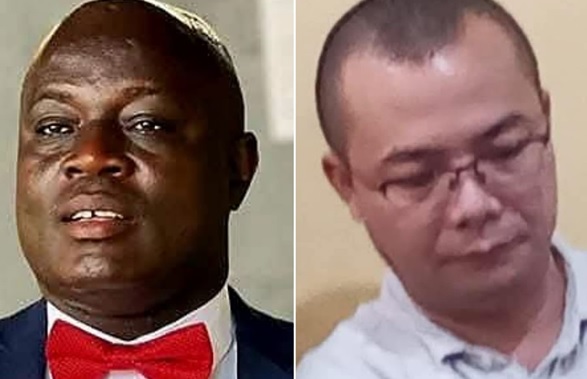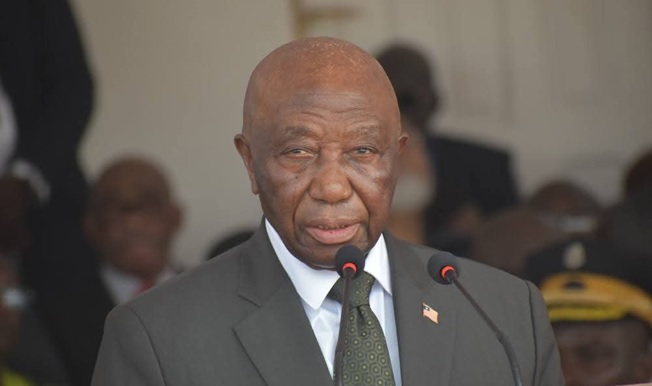The Liberian judiciary is once again at the center of controversy, this time over a decision that reeks of corruption and judicial manipulation. Associate Magistrate Andrew N. Bropleh of the Monrovia City Court is facing public backlash for allegedly overriding a remand order and granting the immediate release of Chinese national Michael Shio, who stands accused of brutally torturing Liberian citizen Momo David. Bropleh’s decision has reignited concerns about the integrity of Liberia’s judicial system and the role of judges in shielding wealthy and well-connected individuals from accountability. The fundamental question now is: Who is this judge, and how did he come to wield such unchecked power?
Despite the gravity of the charges, Magistrate Bropleh approved a $5,000 criminal bond for Shio, along with Andrew Barmoh, Sunday Sumo, and Emmanuel Nyumah. These individuals stand accused of Aggravated Assault, Criminal Conspiracy, and Criminal Facilitation in connection with the horrific torture of Momo David. Sky International Insurance Company, acting on their behalf, provided the surety bond, ensuring their release pending trial. However, legal experts argue that such a low bond for such brutal allegations undermines the seriousness of the charges and raises further concerns about Bropleh’s judgment. Critics question whether this decision was influenced by financial or political interests, rather than the pursuit of justice.
Shio, 41, along with three security guards, according to police investigators, tortured Momo David, 31, for days, locking him in a bathroom, pouring hot oil over his body, and unleashing attack dogs on him, leaving him with gruesome injuries. The Monrovia City Court had initially ruled that Shio and his co-defendants be remanded at the Monrovia Central Prison while awaiting trial. However, in a shocking twist, Magistrate Bropleh allegedly intervened just minutes later to secure Shio’s release under highly questionable circumstances.
Bropleh’s handling of this case raises serious ethical and legal questions. The claim that Shio and his co-defendants filed a valid bond has been disputed by legal experts who suggest that the bond did not meet the necessary requirements for their release. So, why did Bropleh allow it? Was he pressured, or did he make a deliberate decision to favor Shio? This is not just a procedural error; this is an outright subversion of justice.
Bropleh’s decision casts doubt on whether Liberia’s judges are truly independent or if they are simply pawns in a larger system of judicial corruption. How did he rise to the position of Associate Magistrate? Was he properly vetted before being appointed? Did the Liberia National Bar Association (LNBA) recommend him, or was he simply inserted into the judiciary through political connections? The public deserves to know the answers to these questions because a judge who prioritizes the powerful over the rule of law is a danger to Liberia’s fragile democracy.
Magistrates like Bropleh wield significant power, yet there seems to be no clear system of accountability when they make questionable decisions. If Bropleh can unilaterally overrule a court’s remand order to benefit a foreign businessman accused of attempted murder, then what else has he done in previous cases? How many other accused criminals has he quietly released under similar circumstances? This is why Liberia’s judiciary is constantly accused of corruption, it is not just about flawed laws but about compromised judges who refuse to uphold them.
Bropleh’s actions also raise concerns about foreign influence in Liberia’s justice system. Would he have acted the same way if the accused were an ordinary Liberian? Or is his willingness to bend the law tied to the fact that Shio is a wealthy foreigner with powerful connections? The perception that expatriates and foreign investors can buy justice in Liberia is dangerous. It sends a clear message that Liberian lives are worth less in their own country.
The outcry over Bropleh’s decision is not just about this case. It is part of a larger pattern of judicial failures that have allowed powerful individuals, both local and foreign, to escape consequences for serious crimes. Liberia has seen far too many instances where politically connected individuals and business elites manipulate the courts to avoid accountability. Michael Shio’s lawyer, Halary Koffa, is the brother of House Speaker Cllr. J. Fonati Koffa, which only fuels suspicions that political influence played a role in Bropleh’s decision.
The case also implicates Pilot Security Guard Service, the firm whose guards were involved in the attack on Momo David. The company is owned by former DEA boss Abraham Kromah, raising further concerns about whether Shio had high-level protection within Liberia’s security establishment. The deeper one looks, the more this case appears to be a coordinated effort to cover up a crime rather than pursue justice. And at the center of it all is Judge Andrew Bropleh, whose ruling single-handedly undermined the legal process.
If Liberia is serious about restoring faith in its judiciary, then Bropleh’s decision must be thoroughly investigated. The Supreme Court and the LNBA must review whether his actions were lawful and ethical. If he violated legal protocols, he must be removed from the bench immediately. Judges cannot be allowed to operate above the law, making decisions that favor the rich and well-connected while ordinary citizens suffer.
Meanwhile, Momo David continues to endure immense pain as he struggles to recover from the severe burns and injuries he sustained. His family has voiced frustration over the slow pace of justice, and rightfully so. How can justice prevail when a judge like Bropleh is permitted to make unilateral rulings that favor the accused? Liberia cannot afford to let this case fade into obscurity. The public, human rights organizations, and civil society must demand accountability and action.
This case is a test of Liberia’s legal system. If Andrew Bropleh is allowed to make such a hasty and unjust decision without consequences, then the message is clear: Liberia’s courts are not for justice but for those who can afford to buy it. The judiciary must choose, will it uphold the law, or will it continue down the path of corruption and impunity? The nation is watching.







